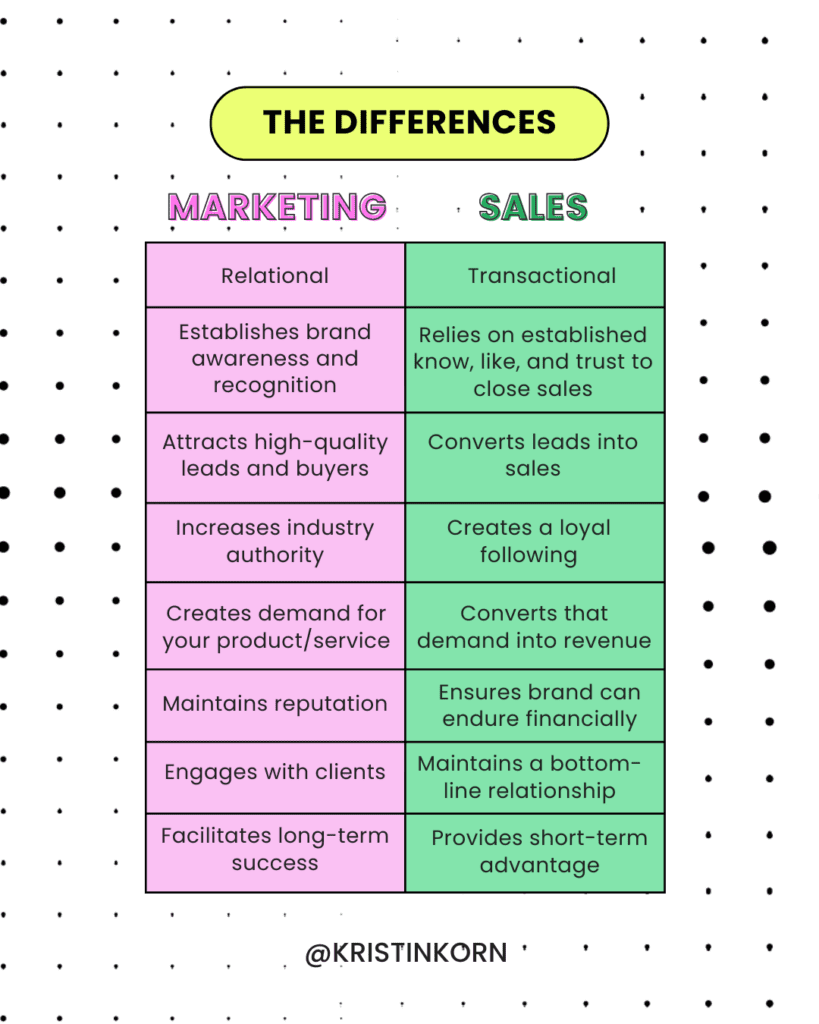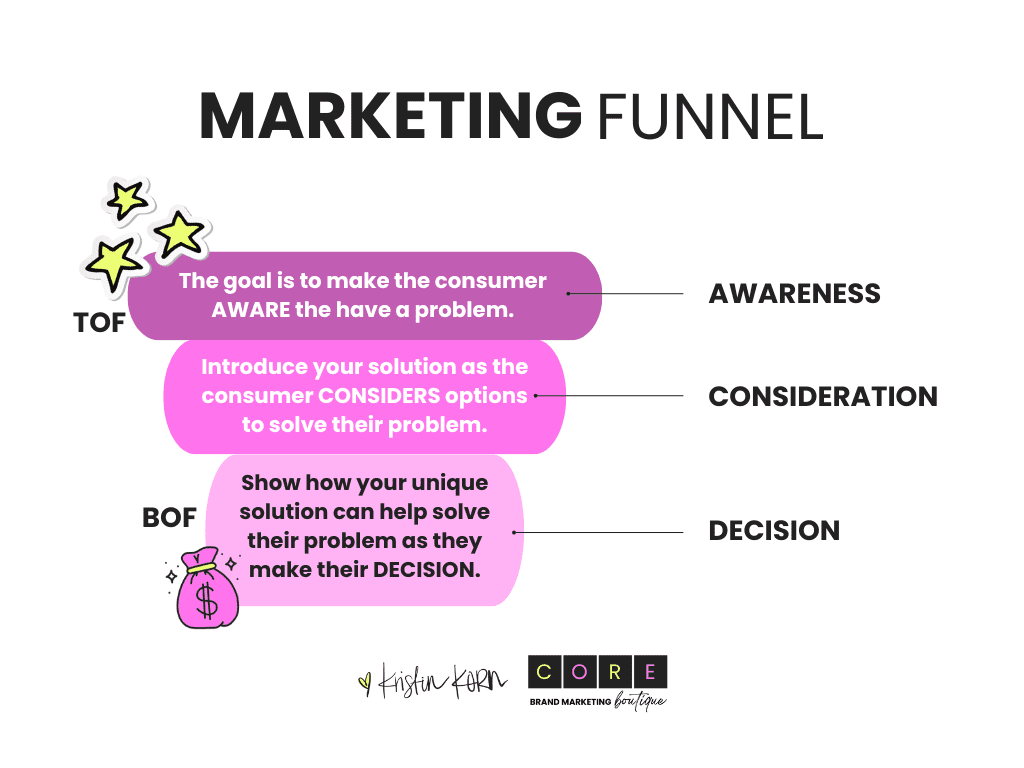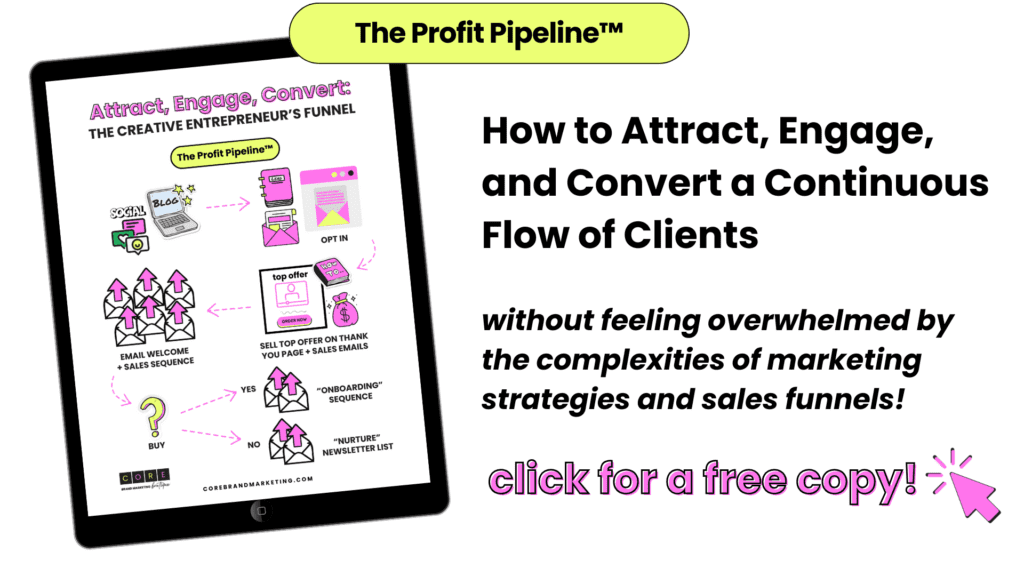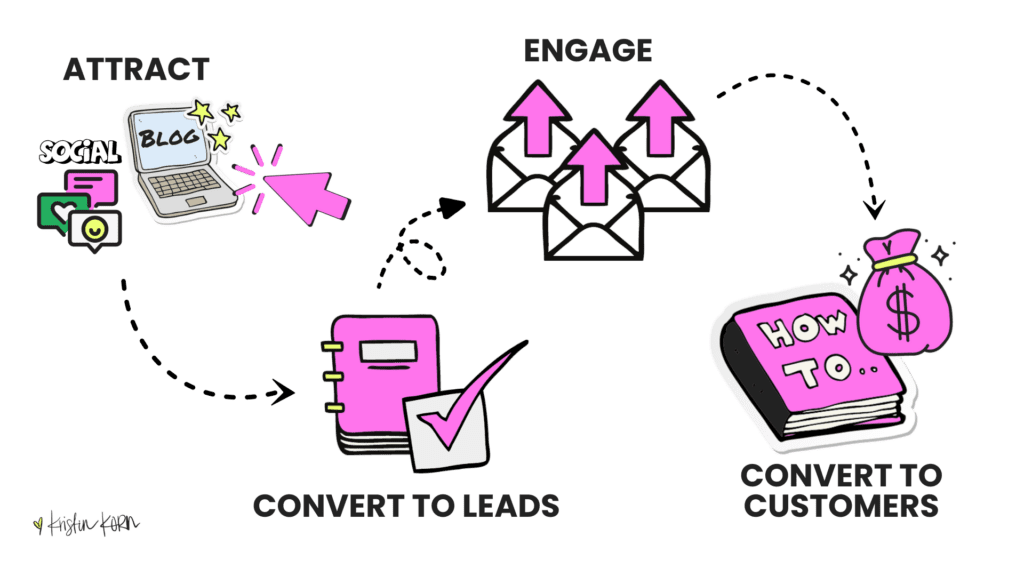In the world of creative entrepreneurship, one question often looms large: should you focus on sales or marketing? As creators, we’re driven by passion and innovation, not by the intricacies of business strategies. Yet, achieving success in today’s competitive landscape requires a savvy approach to both sales and marketing. So, how do you decide where to channel your energies? In this blog article, we’ll delve into the unique roles and the difference between sales and marketing and how leveraging the right balance with the right tools can empower you to master your market without the burnout.
Table of Contents
Difference Between Sales and Marketing: Listen here
What is the difference between sales and marketing?
Sales and marketing are two critical aspects of any business, including creative ones. However, they serve distinct roles and have different objectives.
The difference between marketing and sales is that marketing is focused on creating awareness and generating leads, while sales is focused on closing deals and generating revenue.
Here’s a simple sales vs marketing graphic to refer to.
Without marketing, there would be no demand for products or services – thus no sales.
To put it simply, marketing is the process of creating demand for a product or service, while sales is the process of converting that demand into revenue.
What is Marketing?
Marketing is a broad term that encompasses all activities a business undertakes to promote its products or services. For creators and creative businesses, this might include social media promotion, content creation, email campaigns, SEO optimization, and more. The goal of marketing is to raise awareness, build a brand, attract potential customers, and nurture relationships with them.
In short, marketing is all the interaction taken with your brand before a buyer hands over their credit card to make a purchase with you.
KRISTIN KORN
When referring to a marketing funnel, you can see below – the buyer’s goes through a journey (awareness, consideration, decision) before ever making a purchase. Alongside that are the customer awareness levels a buyer has of their problem and possible solutions out there for them to fix it – introduced by top-of-funnel marketing to the bottom-of-funnel marketing angles.
Marketing strategies for creative businesses often involve showcasing the creator’s unique skills, talents, or products/services, telling their story, and connecting with the audience on an emotional level.
It also involves understanding the target market’s needs and desires and tailoring the messaging to resonate with them.
What is Sales?
On the other hand, sales is a more direct process that involves converting potential customers (leads) into actual customers who purchase the product or service.
For creators, this could involve direct interactions with customers, live demos, closing proposals, or even implementing a sales funnel to automate the process. It’s a direct, active method of converting leads into paying customers. It’s about making that final push that convinces a potential customer to make a purchase.
Sales strategies for creative businesses often center around demonstrating the value of the product or service, overcoming objections, and ultimately convincing the customer to make a purchase. My Profit Pipeline™ method is an example of a sales strategy that automates the sales process, leading to consistent and sustainable growth.
Sales vs marketing: which one should you focus on?
This is a question that many solopreneurs struggle with. Marketing is necessary to create awareness and generate leads, but sales is what converts those leads into customers.
So, which one should you focus on? The answer may not be what you expect…
When we talk about sales, it’s important to remember that it’s not just about making a transaction. It’s about creating a positive experience for the customer that will lead to future sales, referrals, and a strong reputation for your business. It’s about listening to customers, understanding their needs, and providing value.
While marketing creates awareness and attracts leads, sales is the process that turns those leads into customers. Both are crucial to a business’s success and, when used effectively, can lead to sustainable growth. However, thanks to advances in technology and changing consumer behavior, the lines between sales and marketing are becoming increasingly blurred.
However, as a creator, your time is precious. That’s why using tools like the Profit Pipeline™ method can be so beneficial. It takes care of the heavy lifting in both sales and marketing, leaving you with more time to do what you love: create.
Marketing Is the Foundation of Your Business
Think of your business as a house. The foundation is what keeps the house standing—without it, everything else would come crashing down. The same is true of marketing; it’s the foundation upon which your entire business is built.
Without marketing, there would be no leads to speak of, and without leads, there can be no sales. In other words, marketing lays the groundwork for the entire sales process.
Marketing Should Be Given Equal Priority to Sales
Given the importance of marketing, it should be given equal priority to sales. But all too often, business owners put sales first and marketing last—or worse, they don’t invest in marketing at all. Yikes!
If you want your business to succeed, you need to start investing in marketing now. Without a steady stream of leads, there’s no sales process to speak of. And without marketing, there would be no leads in the first place. Market your business effectively, and you’ll lay the foundation for long-term success.
“Salespeople and marketers close the deal together. It has always been a team effort, and it will always stay that way.” – Nancy Marshall
What are some of the benefits of focusing on sales and marketing in your business?
It’s often said that you need to focus on either sales or marketing, but the truth is that you actually need to focus on both.
Here’s why:
- Marketing can help support sales goals by providing leads and creating a pipeline of potential customers.
- Sales can help support marketing goals by bringing in new customers and growing customer loyalty.
Together, sales and marketing can create a powerful one-two punch that will help your business grow.
The Benefits of Focusing on Marketing
There are a number of reasons why focusing on marketing will help you get more bang for your buck.
- First and foremost, marketing is an essential part of growing any business. You need to get the word out about what you do, why you’re unique, and what problem you solve for your target market.
- Secondly, a strong marketing strategy will help you attract more high-quality leads—leads that are more likely to convert into paying customers.
- Finally, good marketing will help build brand awareness and loyalty over time, making it easier and easier to sell to new and existing customers alike.
In short, investing in marketing now will pay dividends down the road in terms of both increased sales and decreased costs.
The Benefits of Focusing on Sales
While it is important to focus on marketing to generate leads and create awareness for your product or service, it is also essential to have a strong sales process in place to convert those leads into customers.
Sales is all about closing deals and generating revenue, which is the key to growing any business.
A good sales process involves actively pursuing and closing deals with potential customers. It requires a lot of hard work and determination, but with the right approach, it can be extremely successful. And when your sales efforts are successful, it can result in more revenue, more profits, and a stronger bottom line.
How can you start to implement sales and marketing in your business today?
The good news is that there are a number of affordable ways to market your business effectively, from social media, advertising, and public relations to content marketing to get out there and start promoting your business!
2 simple ways to use marketing in your small business
- You can start by creating a strong social media presence. Use platforms like Facebook, X, and Instagram to share your story with the world. Post engaging content that will make people want to learn more about what you do. And make sure to include calls-to-action that will encourage people to go the next step with you by downloading a lead magnet, reading a blog, or signing up for your email list. Tip! The goal of social media isn’t necessarily to keep them as followers but to get them off the platform and onto your email list.
- You can also use content marketing strategies like blogging or podcasting to attract new leads and build relationships with potential customers. These methods allow you to share your expertise with the world and position yourself as an authority in your industry. When people see that you know what you’re talking about, they’ll be more likely to do business with you when they’re ready to buy. Tip! Having a strong SEO strategy is so important and blogs and podcasts work well for this!
5 Ways to use your sales team effectively
Sales are the lifeblood of any small business. Without a steady stream of sales, your business will quickly dwindle. That’s why it’s so important to make sure you’re using sales effectively in your small business.
Even if you have yet to hire a sales team or never will – you, the solopreneur, should focus on these tips to close more sales.
There are several key ways to do this:
- First, make sure your sales team is properly trained to handle leads from marketing. They should be able to understand the customer’s needs and recommend the right products or services. Aka – the customer journey.
- Second, provide your sales team with information about the leads they’re working on, including the demographics of the customer and their interests. This will help them tailor their approach to each lead.
- Third, train your sales team to ask questions that will help them understand the customer’s needs. This way, they can offer solutions that meet those needs.
- Fourth, follow up with leads promptly and make sure you’re providing them with the information they need to make a purchase.
- Finally, work with your marketing team to create targeted campaigns that will appeal to your target market. By following these tips, you can ensure that your small business is making the most of its sales efforts.
4 Ways to Improve Your Sales with Marketing
When it comes to making sales, marketing is essential. After all, how can you sell something if people don’t even know that it exists? However, simply having a marketing campaign isn’t enough. You need to ensure that your marketing strategy is on point if you want to see results.
Here are four ways to do just that.
1. Do Your Research
Before you start putting together your marketing campaign, you need to do your research. You need to understand who your target audience is and what they want. What are their pain points? What are their needs and desires? Once you understand who your target audience is, you can start creating content that speaks to them at their current customer awareness level.
2. Plan Your Campaigns Carefully
Once you know who your target market is, it’s time to start creating content that appeals to them. This could be anything from blog articles to social media posts and even videos.
At CORE Brand Marketing Boutique, we focus on using a mix of content on various platforms. These include blog articles, SEO, email marketing, and social media with paid advertising sprinkled in.
The key is creating valuable and interesting content for your target market, which will help them bring awareness to and solve their problems. If you can do that, they’ll be much more likely to buy from you in the end.
Carefully planning your marketing campaigns will help ensure that they are successful. You need to set clear goals and objectives for each campaign and then create a detailed plan of action that will help you achieve those goals. Make sure to track your progress along the way so that you can adjust your strategy if necessary.
How many SEO Keywords will you target, how many symptoms will you talk about, how many articles will you write or lead magnets will you offer? These are the types of marketing goals I use in a campaign.
Related Article: The Beginner’s Guide to SEO Copywriting
3. Build Relationships
Another important aspect of effective marketing is building relationships with potential and current customers.
This means staying in touch with them and providing them with helpful information on a regular basis.
The more connected they feel to you and your brand, the more likely they will do business with you when they need what you’re selling. There are a few easy ways to stay in touch with your customers, like email newsletters or social media groups.
Tip! Using automated email sequences in your marketing funnels is what gets the job done here. No more manual effort because it only gets put on the back burner. Set up your email automation and turn them on! They will do the selling for you!
4. Evaluate Your Results
Finally, always be testing and tweaking your marketing efforts so that you can continually improve results. Try different things and see what works best for your business.
New angles with symptoms and pain points, a different lead magnet, new social channel?
Then, once you find what works, keep doing more of it! Never stop testing and improving or you’ll start falling behind the competition.
Marketing is essential if you want to improve your sales, but simply having a marketing campaign isn’t enough. You need to ensure that your marketing strategy is on point if you want to see results.
Doing your research, carefully planning your campaigns, and evaluating your results will help ensure that your marketing efforts are successful. Implement these three tips today and start seeing results tomorrow!
Related Article:
The Power of Automation: How to Grow Your Business While Focusing on Your Craft
Final thoughts: Sales vs Marketing: The Ultimate Showdown
So what’s the bottom line? Both sales and marketing are essential for a creator or creative business.
Marketing helps attract potential customers, while sales convert these potentials into paying customers. However, it’s important to strike a balance.
As a creator, you want to spend your time creating, not getting bogged down in complex marketing strategies or sales processes. That’s why services like those I provide, which aim to empower creators and automate success, are so valuable. They offer solutions that allow creators to focus on their passion while still achieving business growth.
At CORE Brand Marketing Boutique, we go through a thorough brand foundation phase with each client, so we can really understand who their target audience is and the unique value proposition the brand offers. Aka – what sets you apart!
Before a website is built or a marketing campaign is scheduled, we must do critical research to create the correct content that will speak to this particular niche audience and better yet niche problem.
If you are great at closing sales but need a marketing team to help you reach more people, grow your brand awareness, and strengthen your industry credibility – consider hiring our CORE team! You can fill out an application to work with our team and see our current pricing online at corebrandmarketing.com. We look forward to serving you soon.
Whenever you’re ready, here are 3 ways I can help you:
- Build a Continuous Flow of New Clients Using This Simple Profit Pipeline™ – HERE!
- Turn Your Chaos Into Clarity in Just 90 Minutes with this One Call – HERE!
- Obtain the Support System You Need Inside Our Coaching Group – HERE!
Since I share awe-inspiring resources and must-have products for business builders like you who want to streamline their business – my content may contain affiliate links for products I use and love. If you take action (i.e. subscribe, make a purchase) after clicking one of these links, I’ll earn a small commission. While it has no effect on your pricing, it’s my responsibility to let you know that an income (however small or large it may be) is made from recommending products I love, use, and share with other awesome people like yourself. With your support, I’m able to commit time to this blog and to each of you on your journey!








